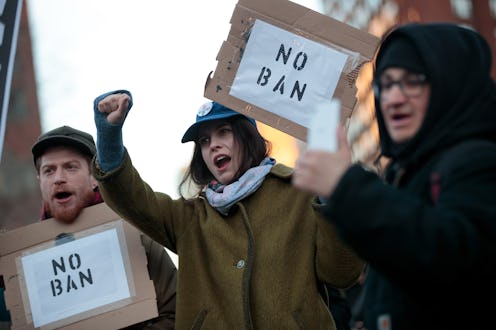News
This Is The Best Part Of The Revised Travel Ban Ruling

President Trump's second attempt at instating a nationwide travel ban against a number of predominantly Muslim countries was effectively halted by a federal judge in Hawaii on Wednesday. The judges ruled the ban unconstitutional on the basis of "significant and unrebutted evidence of religious animus," protecting the ability of citizens to travel between the United States and targeted countries. But this decision may have another unexpected consequence: The travel ban ruling might force Trump to welcome refugees in greater numbers than he had initially planned.
The ruling by U.S. District Judge Derrick Watson of Hawaii blocks the implementation of two key aspects of Trump's Executive Order. One is the infamous travel ban, which is probably what you've heard most about. The other is the less frequently discussed new cap that Trump is attempting to place on admitting refugees into the country. While former President Obama had committed the United States to accepting 110,000 refugees this fiscal year, Trump has proposed to slash that number to 50,000. And since 30,000 refugees have already been admitted since October (the start of the fiscal year), this policy would affect thousands of refugees waiting in limbo for the opportunity to resettle in America.
While the ruling does not explicitly state that the number of newly admitted refugees should return to the original cap put in place by Obama, it does block the new admissions cap. And many resettlement agencies are interpreting it as a hopeful sign that Trump may be lawfully forced to accept thousands more refugees than he initially intended, a striking blow to his "America-first" ideology.
Officials at the State Department have not specifically said which refugee cap they are operating under, but have said that they are working closely with legal teams and refugee resettlement agencies to comply with the order, according to the Huffington Post.
The fact that Trump's own anti-Muslim rhetoric is being used against him does not bode well for him in future court cases. If Trump decides to send this case to the Supreme Court, or create a new executive order that limits the number of refugees the United States will accept, it's likely that federal judges will again argue that the policy is discriminatory and in violation of the Establishment Clause of the Constitution. And if Trump refuses to cooperate with Obama-instated refugee caps, he will be in violation of a court order.
While the travel ban and the refugee cap are projected to have a long legal battle ahead, Trump is momentarily stuck adhering to Obama-era standards that open America's doors to thousands of the world's most vulnerable refugees, the very population that Trump has vowed to keep out — at least temporarily.